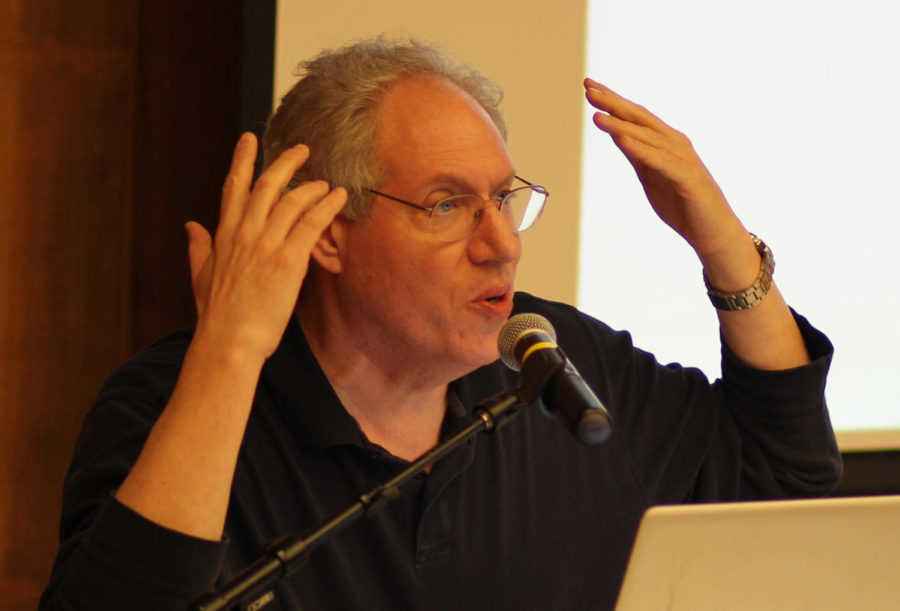Lecturer explains free will illusion
August Berkshire, atheist activist, speaks at the Memorial Union on March 28.
March 28, 2016
A well-known member of the atheist community visited Iowa State on Monday to speak about his belief that humanity can be improved if everyone believed in the illusion of free will.
August Berkshire, director-at-large on the Minnesota Atheists board of directors, spoke in the Pioneer Room of the Memorial Union about his free will beliefs. Berkshire has been active in the atheist community since 1984.
Berkshire, who grew up in a devout New England Catholic family, was heavily involved in his church as a youth. He was an altar boy and was able to experience what he believes are the theatrics of the church. During his senior year of high school, he began following more scientific trends, which led to him becoming agnostic.
His beliefs caused him to have a brief family estrangement after revealing his newfound activities to his family.
“After a while, they realized that I as a person didn’t change,” Berkshire said. “My thinking on this one particular area had changed, but I was still their son. They eventually realized that that was who I am.”
Berkshire said it took about three to five years for him to fully convert from believer to atheist. In 1984, the atheist movement reached the Twin Cities, where he was living at the time and he helped co-found the Minnesota Chapter of American Atheists. The chapters of this organization later dissolved and his group became the Minnesota Atheists in 1991.
Berkshire has been elected as the president of the Minnesota Atheists on and off since 1991. The Minnesota Atheists only allows a three-year presidential term, followed by a year of inactivity before being allowed to be president again. Berkshire hopes that the new, younger members are capable enough to handle being president so he can stay in his role on the board.
“That’s how you know a nonprofit is successful, when it outlives the founders,” Berkshire said.
In his lecture, “The Illusion of Free Will and its Impact on Moral Responsibility,” Berkshire discussed his belief that free will does not exist. He talked the members of the crowd through his research on free will and gave them his case as to why it does not exist.
Free will is the belief that every decision humans make is a conscious choice. Berkshire believes every action people make is programmed in them and is triggered by their environment.
Berkshire used science throughout the lecture to support his beliefs. He highlighted three scientific studies conducted during the last 30 years that showed the brain reacted before the person being tested consciously decided to comply with the study. He believes this is proof of the illusion of free will.
Berkshire also highlighted his belief that ego is the main reason why many people do not accept the belief that free will is an illusion. He said many concerns he hears revolve around people being afraid that people’s behavior will change for the worse if people find out they are not in control of themselves.
Berkshire believes there are multiple benefits to no free will. One of these is that if people cooperate with each other, instead of competing, positivity will be reinforced. Reinforcing positivity and cooperation, in his opinion, will help improve society because people will have no reason to act on the negative traits they were born with and exposed to in their youth.
“Human brains are open to persuasion since learning has survival benefit,” Berkshire said. “So it’s useful and not pointless for us to behave kindly toward others and encourage others to behave kindly as well.”
Feryl Cutkomp, junior in history, was impressed by how well Berkshire was able to tie together his lecture to make a new subject understandable. Cutkomp also said the lecture opened his mind.
“I never really considered the idea that free will wasn’t real, and then after this, it’s definitely a possibility in my mind now that maybe its not as straightforward as I thought it was,” Cutkomp said.







